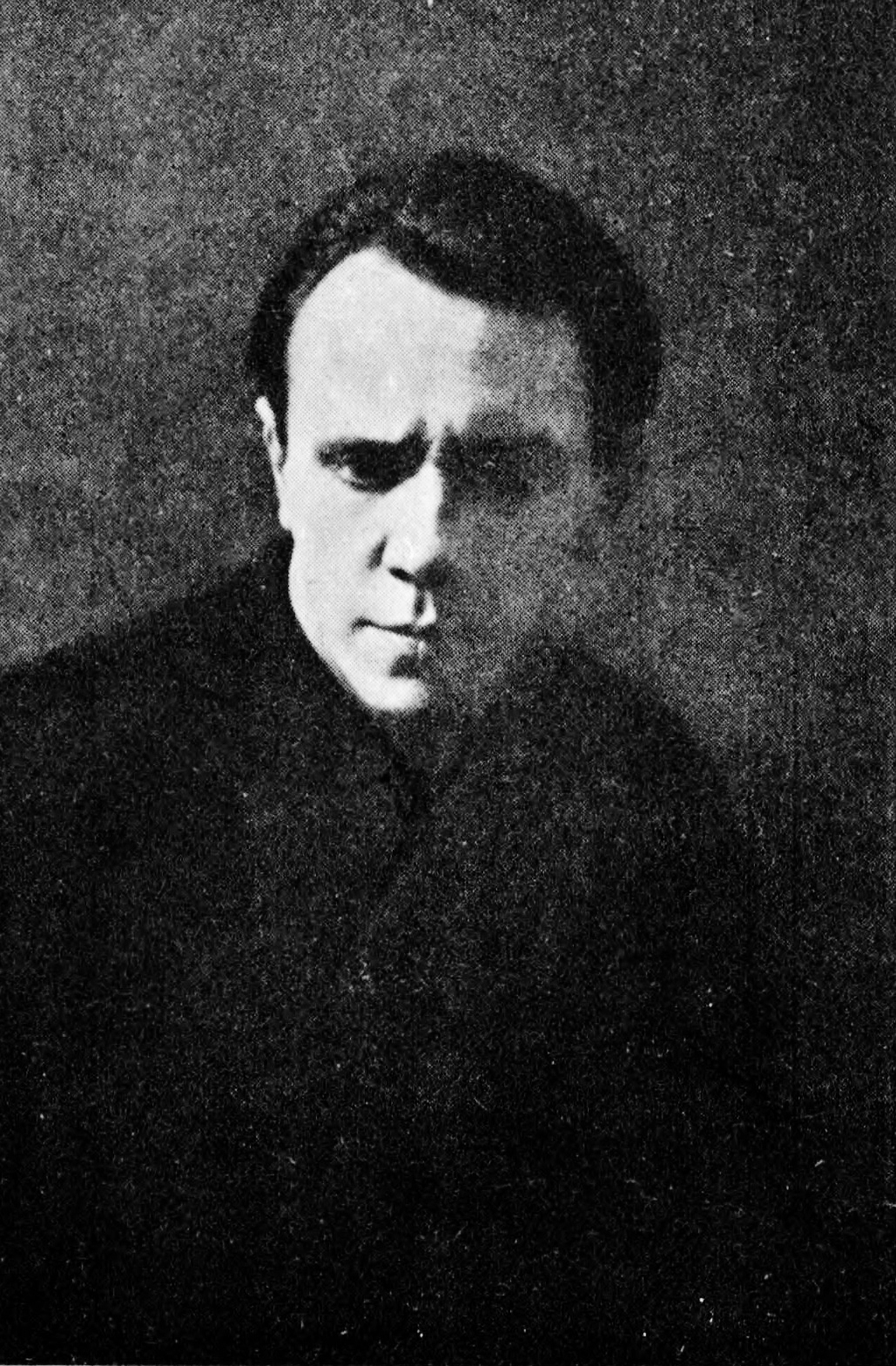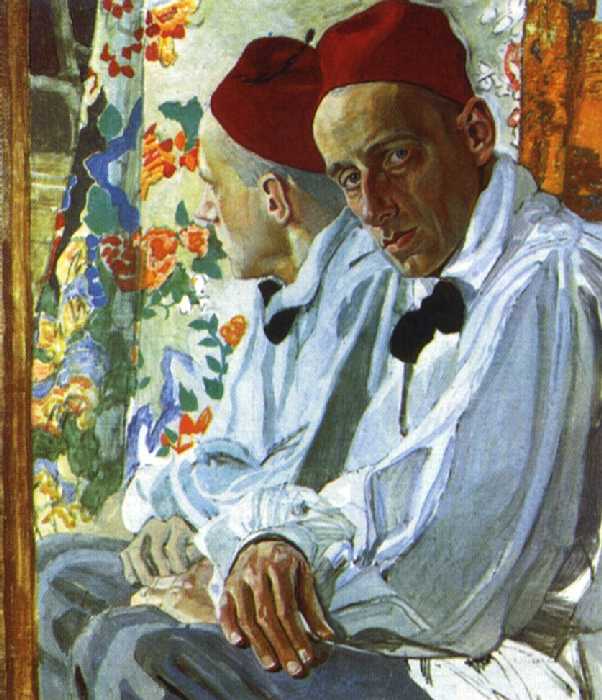|
Theatre Director
A theatre director or stage director is a professional in the theatre field who oversees and orchestrates the mounting of a theatre production such as a play, opera, dance, drama, musical theatre performance, etc. by unifying various endeavors and aspects of production. The director's function is to ensure the quality and completeness of theatre production and to lead the members of the creative team into realizing their artistic vision for it. The director thereby collaborates with a team of creative individuals and other staff to coordinate research and work on all the aspects of the production which includes the Technical and the Performance aspects. The technical aspects include: stagecraft, costume design, theatrical properties (props), lighting design, set design, and sound design for the production. The performance aspects include: acting, dance, orchestra, chants, and stage combat. If the production is a new piece of writing or a (new) translation of a play, the director ... [...More Info...] [...Related Items...] OR: [Wikipedia] [Google] [Baidu] |
Germany
Germany, officially the Federal Republic of Germany, is a country in Central Europe. It lies between the Baltic Sea and the North Sea to the north and the Alps to the south. Its sixteen States of Germany, constituent states have a total population of over 84 million in an area of , making it the most populous member state of the European Union. It borders Denmark to the north, Poland and the Czech Republic to the east, Austria and Switzerland to the south, and France, Luxembourg, Belgium, and the Netherlands to the west. The Capital of Germany, nation's capital and List of cities in Germany by population, most populous city is Berlin and its main financial centre is Frankfurt; the largest urban area is the Ruhr. Settlement in the territory of modern Germany began in the Lower Paleolithic, with various tribes inhabiting it from the Neolithic onward, chiefly the Celts. Various Germanic peoples, Germanic tribes have inhabited the northern parts of modern Germany since classical ... [...More Info...] [...Related Items...] OR: [Wikipedia] [Google] [Baidu] |
Orson Welles
George Orson Welles (May 6, 1915 – October 10, 1985) was an American director, actor, writer, producer, and magician who is remembered for his innovative work in film, radio, and theatre. He is among the greatest and most influential filmmakers of all time. Aged 21, Welles directed high-profile stage productions for the Federal Theatre Project in New York City—starting with a celebrated Voodoo Macbeth, 1936 adaptation of ''Macbeth'' with an African-American cast, and ending with the political musical ''The Cradle Will Rock'' in 1937. He and John Houseman founded the Mercury Theatre, an independent repertory theatre company that presented productions on Broadway through 1941, including a modern, politically charged ''Caesar (Mercury Theatre), Caesar'' (1937). In 1938, his radio anthology series ''The Mercury Theatre on the Air'' gave Welles the platform to find international fame as the director and narrator of The War of the Worlds (1938 radio drama), a radio adaptation ... [...More Info...] [...Related Items...] OR: [Wikipedia] [Google] [Baidu] |
Yuri Lyubimov
Yuri Petrovich Lyubimov (; 5 October 2014) was a Soviet and Russian stage actor and director associated with the internationally renowned Taganka Theatre, which he founded in 1964. He was one of the leading names in the Russian theatre world. Life and career Lyubimov was born in Yaroslavl in 1917. His grandfather was a kulak who fled to Moscow to escape arrest during the collectivisation. Lyubimov's father, Pyotr Zakharovich, was a merchant, who worked for a Scottish company, and his mother, Anna Alexandrovna, was a half- Russian and half-Gypsy schoolteacher. They moved to Moscow in 1922, where both were arrested. Lyubimov studied at the Institute for Energy in Moscow. He was a member of Mikhail Chekhov's Second Moscow Art Theater from 1934 to 1936. During the 1930s, he also met Vsevolod Meyerhold, the avant-garde director. Lyubimov worked in the Song and Dance Ensemble of the NKVD, where he met and befriended Dmitri Shostakovich, Nikolai Erdman and many others. After ser ... [...More Info...] [...Related Items...] OR: [Wikipedia] [Google] [Baidu] |
Michael Chekhov
Mikhail Aleksandrovich Chekhov (; 16 August 1891 – 30 September 1955), known as Michael Chekhov, was a Russian-American actor, Theatre director, director, author, and theatre practitioner. He was a nephew of the playwright Anton Chekhov and a student of Konstantin Stanislavski. Stanislavski referred to him as his most brilliant student. Although mainly a stage actor, he made a few notable appearances on film, perhaps most memorably as the Freudian analyst in Alfred Hitchcock's ''Spellbound (1945 film), Spellbound'' (1945), for which he received his only Academy Awards, Academy Award nomination. Life He was born in Saint Petersburg, the son of Alexander Chekhov (the elder brother of Anton Chekhov) and his wife Natalya Aleksandrovna Golden. It was his father's second marriage. His mother, a Russian Jew, had been the governess to the children from his father's first marriage. He was raised in a middle-class family; his father was in the Imperial Customs Service and was a mod ... [...More Info...] [...Related Items...] OR: [Wikipedia] [Google] [Baidu] |
Yevgeny Vakhtangov
Yevgeny Bagrationovich Vakhtangov (also spelled Evgeny or Eugene; ; 13 February 1883 – 29 May 1922) was a Russian actor and theatre director who founded the Vakhtangov Theatre. He was a friend and mentor of Michael Chekhov.Martin BanhamThe Cambridge guide to theatre Cambridge University Press, 1995, p. 1157:"''Armenian born, Vakhtangov studied law at Moscow University before enrolling at A. I. Adashev’s drama school, where he was taught by, among others, Leopold Sulerzhitsky''." He is known for his distinctive style of theatre, his most notable production being ''Princess Turandot'' in 1922. Early life and education Vakhtangov was born to an Armenian father and a Russian mother in Vladikavkaz, Terek Oblast (now the capital of Northern Ossetia). He was educated at Moscow State University for a short time before joining the Moscow Art Theatre in 1911. Career Vakhtangov rose in the ranks at the Moscow Art Theatre, and by 1920 he was in charge of his own theatre studio. Fo ... [...More Info...] [...Related Items...] OR: [Wikipedia] [Google] [Baidu] |
Vsevolod Meyerhold
Vsevolod Emilyevich Meyerhold (; born ; 2 February 1940) was a Russian and Soviet theatre director, actor and theatrical producer. His provocative experiments dealing with physical being and symbolism in an unconventional theatre setting made him one of the seminal forces in modern international theatre. During the Great Purge, Meyerhold was arrested in June 1939. He was tortured, his wife was murdered, and he was executed on 2 February 1940. Life and work Early life Vsevolod Meyerhold was born Karl Kasimir Theodor Meyerhold in Penza on to Russian-German wine manufacturer Friedrich Emil Meyerhold and his Baltic German wife, Alvina Danilovna (). He was the youngest of eight children.Pitches (2003, pg. 4) His father came from an old noble family Meyerhold von Ritterholm. The elder Meyerhold emigrated to Russia in the 1850s. After completing school in 1895, Meyerhold studied law at Moscow University but never completed his degree. He was torn between studying theatr ... [...More Info...] [...Related Items...] OR: [Wikipedia] [Google] [Baidu] |
Vladimir Nemirovich-Danchenko
Vladimir Ivanovich Nemirovich-Danchenko (; – 25 April 1943) was a Soviet and Russian theatre director, writer, pedagogue Pedagogy (), most commonly understood as the approach to teaching, is the theory and practice of learning, and how this process influences, and is influenced by, the social, political, and psychological development of learners. Pedagogy, taken ..., playwright, producer and theatre administrator, who founded the Moscow Art Theatre with his colleague, Konstantin Stanislavski, in 1898. Biography Vladimir Ivanovich Danchenko was born into a Russian nobility, Russian noble family of mixed Zaporozhian Cossacks, Ukrainian-Armenians, Armenian descent, in the village of Shemokmedi near Ozurgeti (Guria, Georgia (country), Georgia). His father, Ivan Danchenko, was an officer in the Imperial Russian Army, and his mother, Aleksandra Yagubyan (1829–1914), was Armenian from the Tiflis Governorate, Governorate of Tiflis. He went to high school in Tbilisi, continuin ... [...More Info...] [...Related Items...] OR: [Wikipedia] [Google] [Baidu] |
World War II
World War II or the Second World War (1 September 1939 – 2 September 1945) was a World war, global conflict between two coalitions: the Allies of World War II, Allies and the Axis powers. World War II by country, Nearly all of the world's countries participated, with many nations mobilising all resources in pursuit of total war. Tanks in World War II, Tanks and Air warfare of World War II, aircraft played major roles, enabling the strategic bombing of cities and delivery of the Atomic bombings of Hiroshima and Nagasaki, first and only nuclear weapons ever used in war. World War II is the List of wars by death toll, deadliest conflict in history, causing World War II casualties, the death of 70 to 85 million people, more than half of whom were civilians. Millions died in genocides, including the Holocaust, and by massacres, starvation, and disease. After the Allied victory, Allied-occupied Germany, Germany, Allied-occupied Austria, Austria, Occupation of Japan, Japan, a ... [...More Info...] [...Related Items...] OR: [Wikipedia] [Google] [Baidu] |
Ballet
Ballet () is a type of performance dance that originated during the Italian Renaissance in the fifteenth century and later developed into a concert dance form in France and Russia. It has since become a widespread and highly technical form of dance with Glossary of ballet, its own vocabulary. Ballet has been influential globally and has defined the foundational ballet technique, techniques which are used in many other dance genres and cultures. Various schools around the world have incorporated their own cultures. As a result, ballet has evolved in distinct ways. A ''ballet'' as a unified work of art, work comprises the choreography (dance), choreography and music for a ballet production. Ballets are choreographed and performed by trained ballet dancers. Traditional classical ballets are usually performed with classical music accompaniment and use elaborate costumes and staging, whereas modern ballets are often performed in simple costumes and without elaborate sets or scenery ... [...More Info...] [...Related Items...] OR: [Wikipedia] [Google] [Baidu] |
Russia
Russia, or the Russian Federation, is a country spanning Eastern Europe and North Asia. It is the list of countries and dependencies by area, largest country in the world, and extends across Time in Russia, eleven time zones, sharing Borders of Russia, land borders with fourteen countries. Russia is the List of European countries by population, most populous country in Europe and the List of countries and dependencies by population, ninth-most populous country in the world. It is a Urbanization by sovereign state, highly urbanised country, with sixteen of its urban areas having more than 1 million inhabitants. Moscow, the List of metropolitan areas in Europe, most populous metropolitan area in Europe, is the capital and List of cities and towns in Russia by population, largest city of Russia, while Saint Petersburg is its second-largest city and Society and culture in Saint Petersburg, cultural centre. Human settlement on the territory of modern Russia dates back to the ... [...More Info...] [...Related Items...] OR: [Wikipedia] [Google] [Baidu] |
Moscow Art Theatre
The Moscow Art Theatre (or MAT; , ''Moskovskiy Hudojestvenny Akademicheskiy Teatr'' (МHАТ) was a theatre company in Moscow. It was founded in by the seminal Russian theatre practitioner Konstantin Stanislavski, together with the playwright and director Vladimir Nemirovich-Danchenko. It was conceived as a venue for Naturalism (theatre), naturalistic theatre, in contrast to the melodramas that were Russia's dominant form of theatre at the time. The theatre, the first to regularly put on shows implementing Stanislavski's system, proved hugely influential in the acting world and in the development of modern American theatre and drama. It was officially renamed the Gorky Moscow Art Theatre in 1932. In 1987, the theatre split into two theatre company, troupes, the Moscow Gorky Academic Art Theatre and the Moscow Chekhov Art Theatre. Beginnings At the end of the 19th-century, Stanislavski and Nemirovich-Danchenko both wanted to reform Russian theatre to high-quality art that was a ... [...More Info...] [...Related Items...] OR: [Wikipedia] [Google] [Baidu] |








